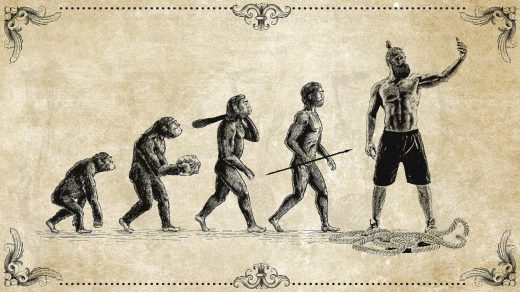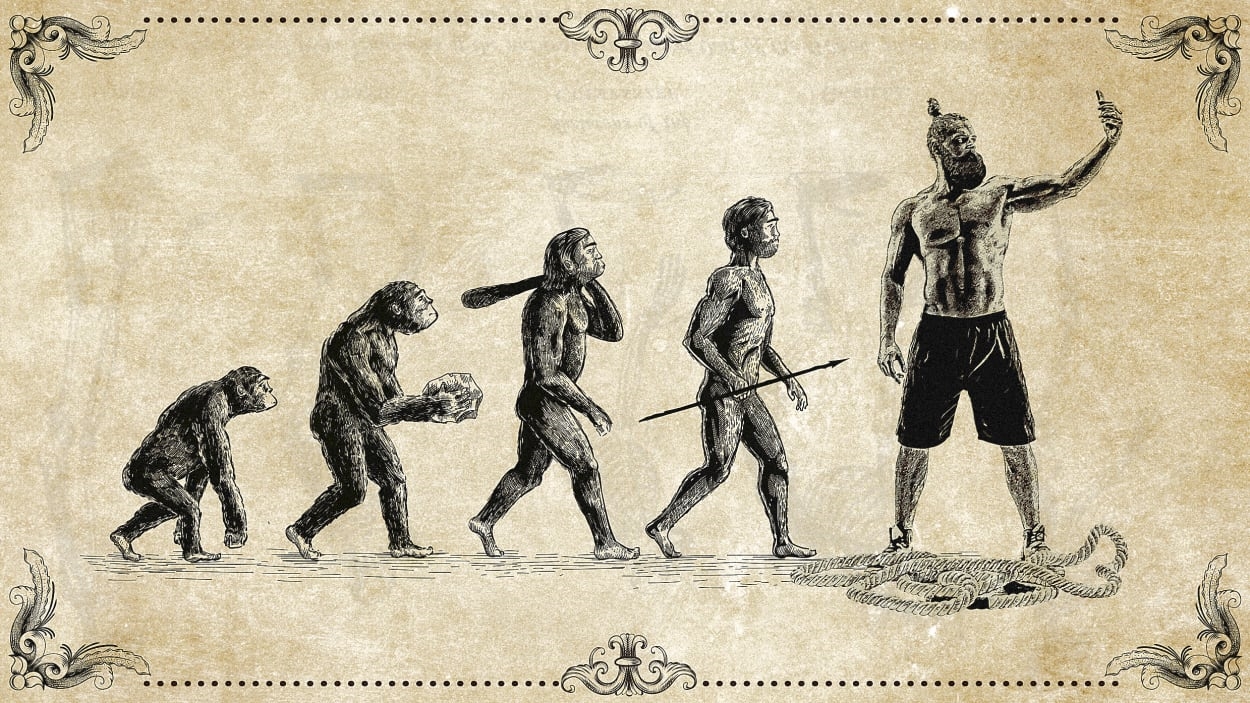After Liver King’s fall, the ancestral living movement will need a new dad
By Ashwin Rodrigues
There’s a caveman-sized gap in the wellness industry.
Brian Johnson, better known as Liver King, has embodied the “ancestral living” movement for the past couple of years, his jacked, sunburnt, Caucasian physique defining the aesthetic for his millions of devotees, regardless of what their own actual ancestors may have looked like.
Johnson’s Instagram and TikTok accounts, followed by more than 5 million people, showcase his ripped body—supposedly built solely through lengthy, grueling workouts and regular consumption of raw beef liver and testicles—and he has popularized certain phrases, such as “Why eat vegetables when you can eat testicles?” through a volume-forward posting strategy. His thriving retail operation, Ancestral Supplements, hawks desiccated cow liver and bull testicle capsules. His “Nine Ancestral Tenets,” a collection of nouns and verbs, are “sleep, eat, move, shield, connect, cold, sun, fight, and bond.”

Today, Johnson is also the defendant in a class-action lawsuit seeking more than $100 million in damages. In December, he admitted to his primals (his name for his followers) that his ancestral physique was due to a rather modern tenet: Inject. Specifically, he took a complex cocktail of steroids and growth hormone that cost more than $10,000 per month.
This information had been revealed in a November video exposé by popular fitness YouTuber Derek from the channel More Plates More Dates titled “The Liver King Lie.” Derek shared emails from Johnson to a bodybuilding coach (as well as to Derek himself) that outlined Johnson’s 2021 plans to blow up—both chemically and on social media—in intricate detail. His marketing plan was “quite brilliant,” says Layne Norton, a natural bodybuilder and physique coach with a PhD in nutritional science who first noticed the eternally shirtless Liver King’s Instagram account when it had just 15,000 followers. When that number crept up to 800,000, Norton thought people must either be “very stupid, or very gullible.”
But Norton also says that people often want to believe “basic, strong statements” without nuance, since they make complex topics around health “more palatable for the human mind.” People often ask for his take on various social-media-borne health trends, and he typically says, “If it walks like a duck and talks like a duck, it’s probably a duck.” Yet quacking is a lucrative business.
The combined health and wellness industry is currently worth upwards of $1 trillion, and there is a fortune to be made in selling a “solution” to the modern world. Foods that might have been available before the dawn of the agrarian era 3,000 years ago hold particular appeal—such as plates of unseasoned meat—as do workouts using minimal equipment. But the packaged food and supplement industries have definitely gotten in the game: Products such as beef bars, ground organ meats, beef tallow capsules, and beef tallow sunscreen all employ the term “ancestral” in their marketing materials. The tag “ancestral living” on TikTok has more than 23 million views. Johnson told GQ in May that his retail business was pulling in more than $100 million a year. Along his journey to the top of the algorithms, Liver King propped up a network of wellness personalities, including a doctor named Paul Saladino, who tout similar messages. Inevitably, there’s going to be a new He-Man wellness guru stepping in.
Thinking about the old days
Rejecting modernity exists on a spectrum. For some, it can simply mean restricting screen time and limiting processed foods—or embracing the ancient practice of Stoicism, like the Silicon Valley tech stars were doing a few years ago. For other guys—and let’s face it, it’s typically men—it can escalate to vilifying seed oils, warning against radiation from in-home WiFi, and decrying life-saving technologies like vaccines. (In some cases, this modernity-rejection can be a red pill to far right ideologies that yearn for better—whiter—times.) For the extremely online, there’s ancestral living brand Carnivore Aurelius, which features a bust of Roman emperor Marcus Aurelius on its Twitter account and tweets constantly against concepts like toothpaste, mouth wash, and fake meat. The owner of the account told BuzzFeed News that the content is meant to be a blend of earnestness and satire. But his company sells two real products: dehydrated liver and steak crisps.
Despite what “ancestral living” influencers and brands say, of course, there was no single monolithic ancestral diet. Depending on culture, geography, and animal and plant availability, our ancestors had diets that varied. But wellness marketers’ tactics often rely on what’s known by both philosophy and health experts as the appeal to nature fallacy, says Rina Raphael, a journalist and author of The Gospel of Wellness. Conveniently, they often avoid mentioning things like fatally poisonous mushrooms, earthquakes, and arsenic, which were quite natural for our forebears but not particularly aspirational vibes today.
Health and wellness companies, it must be noted, have been responding to humanity’s desire to live a simpler life—one that’s in tune with “natural” rhythms—for more than a century, Raphael says. The appeal can come in soft, Goop-y tones that have cosmetically opposite aesthetics to a bodybuilding caveman. But there’s a common thread among these seemingly different influencers: “We’re finding a lot of people who blur the line between health and business growth,” Raphael says.
Derek Beres, currently writing an upcoming book, Ripped: Body Dysmorphia and Male Fragility, and co-host of the Conspirituality podcast, traces the fetish of embracing a less-industrialized time to the introduction of the iPhone, when people began to spend exponentially more time online. He sympathizes and believes that there are some mismatches between modern life and the human body (he advises people to read Harvard University evolutionary biology professor Daniel Lieberman’s book The Story of the Human Body, and think about how the typical running sneaker, which he says is not a natural fit for the human foot, can cause injuries). Beres is also a fan of organ meats, specifically as a way to minimize waste. “It’s the bogus scientific promises” that Beres finds unpalatable.
He believes that most adherents are pining for a time that did not actually exist. If someone were to examine only the social media feeds of Liver King, they might conclude that the ancestral diet was heaps of animal muscle and organs, and little else. However, as Beres notes, meat has historically been a scarce resource meant to be savored and shared.
Ancestral marketing meets modern misinformation
Thanks to advancements in technology, both meat and misinformation are now available in abundance. As the market for “ancestral” health and wellness products has grown, it has become common for unlicensed fitness personalities to drop in references to PubMed, the top medical and science journal database, to support their claims.
The problem, according to Jonathan Jarry, a science communicator with McGill University’s Office for Science and Society, is that the scientific papers cited often don’t support their claims. Jarry uses the term “blinding with science,” to describe how influencers are able to gain a “patina of legitimacy without actually having good evidence behind what they’re saying.”
And the loudest voices win. “Sensible guidance just doesn’t garner eyeballs or clicks,” Raphael says, so influencers often have to resort to “extreme, shocking, novel information,” if they want to be rewarded by the algorithms.

The caricature-like influencers have been able to gain so much ground in part due to a public driven mad by consistent and contradicting headlines about their health, which Raphael calls “nutrition mania.” Along with an increasing public distrust in institutions, people are more susceptible to the deluge of content they see on TikTok or Instagram, while doctors and researchers often don’t have the bandwidth to counter dubious claims due to their full-time responsibilities.
“It’s not about who actually has the facts,” says Joe Holder, a health and wellness consultant and trainer for Nike. “It’s about who can do the most bombastic things and then hopefully tie it in something that just sounds right, even if it might not be true.” (He lists the folks who typically succeed in this realm, from Sam Bankman-Fried to Elizabeth Holmes to Anna Sorokin, and points out that “it’s easier for white folks to scam and still create legitimacy.”)
In a normal world, a guy repeatedly claiming he took an all-natural route to achieving a body that looked like it was pumped with steroids and hormones, only to admit he was actually pumping his body with steroids and hormones, might see his personal brand plummet. But for reasons that future historians may call the George Santos Asterisk, Liver King has parlayed his “caught-for-steroids” moment into something new: He is now claiming that his persona was created to raise awareness for mental health. This new tack has resulted in new high-profile podcast appearances and, of course, opportunities to hawk some organ capsules. His followers have responded with both disappointment and support, though the positivity they feel about him seems surprisingly undiminished.
Johnson has said that 15 year olds on Instagram have wished that Liver King was their dad. Still, following the exposure of his big lie (not to mention the pending lawsuits), there is definitely a lucrative opportunity awaiting a prospective new parent. One possibility would be Dr. Paul Saladino, who goes by Carnivore MD on social media and sells a similar line of organ supplements under the name Heart & Soil. Saladino, Johnson’s former business partner, has put some distance between himself and Johnson in a recent, since-deleted video, in which he claimed to be completely unaware of Johnson’s steroid use. (Another personal trainer, wondering how Saladino couldn’t know, returned to the waterfowl axiom: “If it looks like a duck, if it quacks like a duck, then it’s a f-cking duck,” said Jacob Zemer in a short rant titled “The True Liver King Is Paul Saladino.”
The new dad—or mom—of ancestral living might be held to a higher standard.
More and more credentialed professionals, including scientists and researchers, are joining social media, to “battle the tidal wave of misinformation,” Raphael says. They’re still in the minority, but it can help in stopping the spread. There’s also a consumer fatigue, Raphael says, leading to “more attuned” consumers unwilling to take every social media post at face value.
Fitness influencers are a lot like DJ Khaled albums: They occupy prime real estate on Instagram and constantly invoke a mysterious “they” who is out to get you. But instead of a feature-packed songs, they hawk pricey supplements, gadgets, or a proprietary blend of desiccated cow organs. It’s just a question of who the next shirtless caveman will be, and what he’ll sell as the cure to the modern world.
(36)



